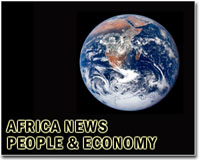| . |  |
. |
Abuja, Nigeria (UPI) Jun 17, 2010 Al-Qaida's North African affiliate is striving to extend its influence into Muslim-dominated northern Nigeria, where there have been bloody clashes with Christians in recent years. Some analysts see this as little more than wishful thinking on the part of al-Qaida in the Islamic Maghreb, the Arabic name for North Africa. But, if it can achieve a linkup, that could spell big trouble in one of Africa's main oil producers, a key supplier to the United States. The country is already gripped by political unrest and a simmering insurgency in the oil-producing, predominantly Christian south. It faces crucial presidential elections in 2011 in which religion is a big factor. AQIM's leader, Abu Mousab Abdel Wadoud, told al-Jazeera television on Monday that his Algeria-based organization plans to provide arms to Nigeria's Boko Haram Islamist movement "to defend Muslims in Nigeria and stop the advance of a minority of Crusaders." He said al-Qaida's global network is interested in sub-Saharan Africa for "its strategic depth that would give a bigger scope for maneuvers." Abdel Wadoud, an Algerian also known as Abdelmalek Drouqdal, told Nigerian Muslims in an Internet message in February, "We are ready to train your sons on how to handle weapons and will give them all the help they need -- men, weapons, ammunition and equipment -- to enable them to defend our people and push back the Crusaders." A Nigerian extremist, Umar Farouk Abdulmutalab, was recruited by another highly active al-Qaida offshoot in Yemen. He was arrested for allegedly attempting to blow up a U.S. airliner over Detroit on Christmas Day last year. He has no known links with Nigeria's Islamist radicals of Boko Haram -- "Western education is forbidden" -- which was formed in 2001 but in recent years a new breed of Muslim activists, many of them well-educated and from the middle class, like Abdulmutalab, has emerged in this pivotal African state. They embrace a more radical form of Islam that rejects all Western and Christian influence. Boko Haram was severely mauled by the Nigerian military in July 2009. Five days of fighting in its stronghold in northeastern Nigeria left at least 800 people dead, including the group's leader. But the movement, which seeks to overthrow the federal government and impose strict Islamic law wasn't totally crushed and has gone underground. For many years, the northern Muslim elite dominated Nigerian politics, enriching themselves and their tribes, alienating the southern Christians. Politics are based on the north-south dichotomy. Nigeria's 150 million people are more or less evenly divided between the Hausa-speaking Muslims in the north and the Christian Yoruba and Ibo tribes in the south. The sectarian divide deepened in 1999, when 12 northern states enshrined Islamic law. Islamic militancy increased after Sept. 11, 2001. In December 2003, a well organized Islamic rebellion by militants who declared an Islamic state in Yobe, one of the Shariah states, was crushed by the army. Nigeria, Africa's most populous nation, would be an immense prize for al-Qaida if it was able to put down roots there from AQIM's main operational zone in Algeria and the Sahel desert region that embraces Mauritania, Chad, Mali and Senegal. Some 70 percent of Nigerians live in abject poverty, potentially fertile ground for al-Qaida's recruiters. Much of the country's wealth has been plundered by successive governments or squandered by corrupt politicians. Nigeria would provide a central base in West Africa, an increasingly important source of oil for the United States and China, from which to attempt to spread Osama bin Laden's international jihad to other oil-rich states in the region where there are large Muslim populations. In recent years Saudi-funded Wahhabi preachers and al-Qaida agents have been moving into East and West Africa at a time when these resource-rich regions have become increasingly important to the industrialized states. In 2001, bin Laden called on Nigeria and other African states to rise up against U.S. "enslavement" and sent emissaries to preach al-Qaida's doctrine. One of his top lieutenants, Imad Abdelwahid Ahmed Alwan, a Yemeni, traveled from Afghanistan in June 2001 to Chad, Niger, Mauritania, Mali, Nigeria and Algeria. Another prominent al-Qaida figure at large in East Africa is Fazul Abdullah Mohammed, indicted for the August 1998 bombings of the U.S. embassies in Nairobi and Dar-es Salaam and deadly attacks in Mombasa, Kenya, in November 2002.
Share This Article With Planet Earth
Related Links Africa News - Resources, Health, Food
 Guinea Bissau prime minister says he will not quit
Guinea Bissau prime minister says he will not quitBissau (AFP) June 16, 2010 Guinea Bissau Prime Minister Carlos Gomes Junior said Wednesday he would not step down and accused certain figures in the tense and unstable west African country of wanting to plunge it into chaos. Gomes returned to the country under police escort Monday after heading to former colonial ruler Portugal at the end of April, officially for health reasons, weeks after the army chief was overthro ... read more |
|
| The content herein, unless otherwise known to be public domain, are Copyright 1995-2010 - SpaceDaily. AFP and UPI Wire Stories are copyright Agence France-Presse and United Press International. ESA Portal Reports are copyright European Space Agency. All NASA sourced material is public domain. Additional copyrights may apply in whole or part to other bona fide parties. Advertising does not imply endorsement,agreement or approval of any opinions, statements or information provided by SpaceDaily on any Web page published or hosted by SpaceDaily. Privacy Statement |